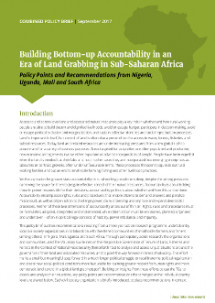Building Bottom-up Accountability in an Era of Land Grabbing in Sub-Saharan Africa Policy Points and Recommendations from Nigeria, Uganda, Mali and South Africa
Temas
Regiones
Access to and control over land and associated natural resources play a key role in whether and how rural working people are able to build decent and dignified livelihoods, avoid or escape hunger, participate in decision-making, avoid or escape political exclusion and marginalization, and sustain collective identities and social reproduction processes.

Land is important in itself, but control of land is often also a precondition for access to water, forests, fisheries, and subsoil resources. Today, land and related resources are under increasing pressures from a new global rush to acquire land for a variety of business purposes. Areas targeted for acquisition are often populated and productive; new economic arrangements involve either expulsion or adverse incorporation of people. People have been expelled when the land is needed but their labour is not; in other cases they are incorporated into emerging enterprises as labourers or contract growers, often under unfavourable terms. These processes threaten to squeeze out rural working families and put an end to small scale farming, fishing and other livelihood practices.


